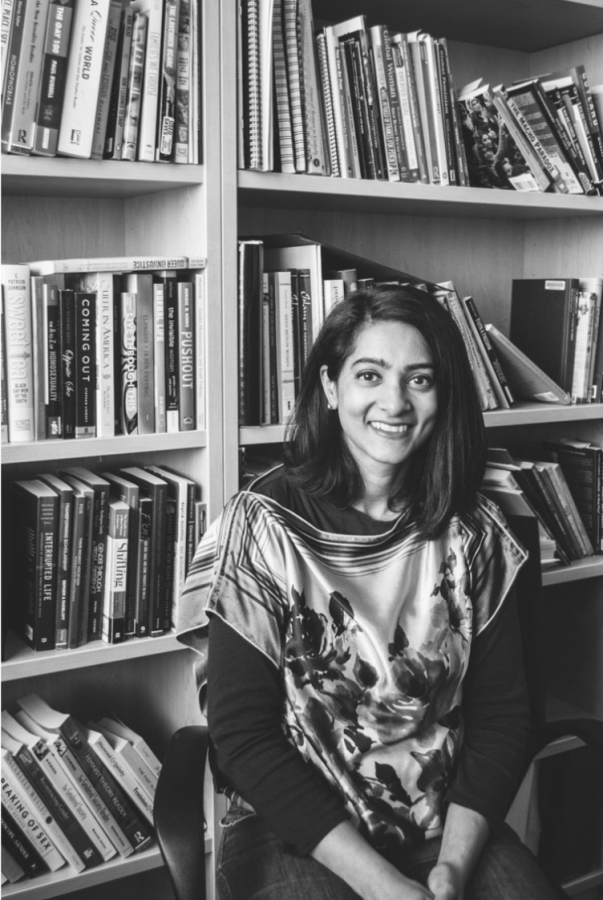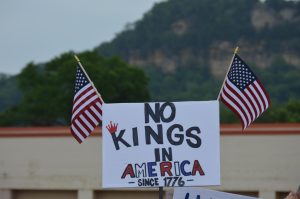Professor Spotlight: Dr. Mahruq Khan
January 10, 2020
Dr. Mahruq Khan has been a professor of the Women’s, Gender, and Sexuality Studies (WGSS) department at the University of Wisconsin-La Crosse for over 10 years. She is from a small suburb outside of Chicago and attended University of Illinois–Urbana for her undergraduate degree before completing her doctoral program at Loyola University Chicago.
Before coming to UWL, she taught at a community college on the south side of Chicago for one year and for the next three years she taught part time as a graduate student at four other universities in the Chicago area.
During her time in undergraduate, Khan changed from an engineering major to business and accounting because she believed this would lead to a more “stable” career, but it was not her calling. “It took two years of first-hand experience as a business analyst in the corporate world in Chicago to realize that I needed to pursue something that was more meaningful to my life,” said Khan.
Khan sought this passion by pursing a doctorate in sociology at Loyola University Chicago. She went into this field of study because of her religious community and to learn about ways to promote social change. Khan said, “My religious community was a salient part of my identity as I was coming of age and during this time I also witnessed a lot of unfair divisions of labor and domestic violence in my extended family and these same issues in the broader society. So, I pursued sociology because it helped me understand social phenomena like religious bigotry, racism and sexism and become a professor provided a platform for making change through research, teaching and community engagement.”
After earning her doctorate Khan began teaching at UWL. “I got a job offer at UWL at a time when the stock market crashed and the economy was tanking. I felt fortunate that I was able to find work and that my colleagues took a chance on me. I would have never guessed that I’d be at UWL for ten years having moved here from Chicago, but having really solid department colleagues and a community of support helps,” said Khan.
“Still, there are challenges of teaching as a woman of color on issues of race and other difficult topics at a predominantly white institution. There is an emotional toll that this work takes that is difficult to quantify but is important to acknowledge. I think UWL and La Crosse, in general, have made my racial identity much more salient in my life than it has been in the recent past. This hyper-visibility has also made the purpose of my work and my ability to make meaningful contributions to this campus- all the more obvious to me.”
Throughout her time in research, Khan says that she loves interviewing people in order to learn more about their lives, struggles and joys. “This personal connection is extremely rewarding on a personal level, especially when the purpose of the interviews is to amplify the voices of marginalized communities in order to address some of the inequities they face,” said Khan. “I also love how much I learn from my respondents, which is why I keep many of my interviews semi-structured (as opposed to a strict list). Often times, my respondents’ stories and motivations reflect some implicit biases that I may have previously held, so they’re a moment of clarity and humility for me.”
Khan’s favorite undergraduate level course to teach at UWL is the WGSS senior seminar. “This class is an opportunity to reach all the Women’s Studies majors and minors right before they leave our program and support them with professional advice as they make the transition to life after graduation and support their capstone projects that encapsulate both their academic passions and the types of skills they want to showcase to either future employers to graduate school admission committees,” said Khan.
She says that her favorite part about teaching is witnessing the engagement levels among the WGSS majors and minors with gender-based issues on campus and in the community. “These are students who care about freedom, fairness and justice. It is an honor to be among them,” said Khan.
For students considering WGSS as a possible major or minor, Khan encourages them to do so. “It can and does lead to both meaningful and paid work. A lot of times, students enter WGSS general education courses, thinking that the content will be irrelevant to their majors or career interests, but this couldn’t be further from the truth. We are taking about and helping create the space to discuss and solve the social issues that they are grappling with from the minute they leave class. Our courses provide both the critical thinking and problem–solving skills that employers are looking for and also give students outlets to engage with projects and social justice-oriented leadership and community experiences that speak to what is going on inside them or their immediate social worlds,” said Khan.
“Students majoring in Women’s Studies can go on to become lawyers, community health professionals, counselors, physical therapists, student affairs administrators, journalists, professors, human resource professionals, reproductive justice advocates, and much, much more, as long as they have taken the appropriate pre-requisites for intended professional programs. The gender, race, social justice focus of our courses combined with the right electives across campus and internship experiences give students have an excellent foundation for their future careers.”
Khan said that any students interested in the major or minor can go to 4300 Centennial Hall or contact any of the faculty with questions.






